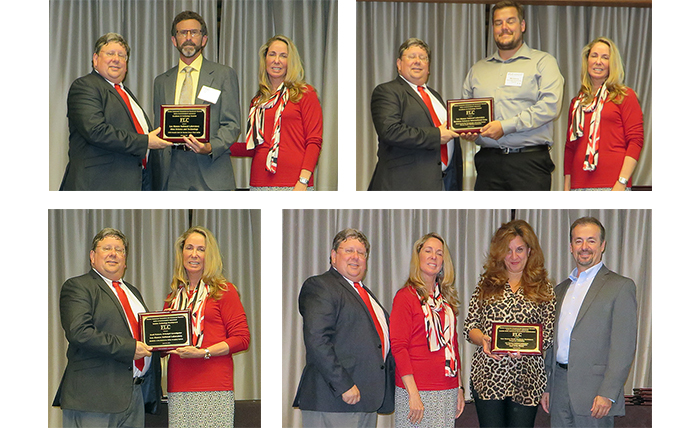Los Alamos Wins Four 2014 FLC Mid-Continent Regional Awards

The FLC Awards Program annually recognizes federal laboratories and their industry partners for outstanding technology transfer efforts. Since 1984, the FLC has recognized honorees at nearly 200 federal laboratories. These awards have become one of the most prestigious honors in technology transfer.
Contact
- The Richard P. Feynman Center for Innovation
- (505) 665-9090
Excellence in Technology Transfer
CASA Grande
To improve safety at nuclear power plants, Dr. Bruce Letellier and his team at Los Alamos National Laboratory (Los Alamos) established a CRADA with the University of Texas to assist South Texas Project Nuclear Operating Company. The partners developed CASA (Containment Accident Stochastic Analysis) Grande, a software code that automates the evaluation of a single postulated accident so that literally thousands of possible scenarios can be assessed. Los Alamos established an exclusive commercial licensing agreement with Alion Science and Technology Corporation in 2013. This technology addresses the Generic Safety Issue of predicting emergency cooling system failure of nuclear facilities. In the United State alone, there are approximately 104 nuclear facilities.
Muon Scattering Technology
Cargo containers are an easy target for terrorists to deliver a potential nuclear disaster. Following the terrorist attacks on September 11th, Los Alamos scientists began using muon scattering tomography to detect and identify concealed nuclear threats. Through a collaborative partnership, Decision Sciences International Corporation (DSIC) signed an exclusive license with Los Alamos National Laboratory and, based on the muon scattering technology, developed the Multi-Mode Passive Detection System (MMPDS). This advanced scanning device locates heavily shielded nuclear and radiological threats inside cargo containers as well as vehicles and rail cars. It can also be used for explosive and contraband detection. Currently, Los Alamos is finalizing a Work-for-Others Agreement with Fukushima site in Japan to assess and aid clean up.
For more information, visit DSIC's website.
Notable Technology Development
MiniMAX: A Revolutionary X-ray Imaging System
The MiniMAX is the world's smallest, most portable x-ray machine that was developed by researchers led by Scott Watson at Los Alamos National Laboratory. Unlike its predecessors, which are a couple of feet wide and quite heavy, MiniMAX weighs five pounds. It can be whisked to accidents, crime scenes, battlefields, airports, sidelines, and any other place that could benefit from on-the-spot x-ray vision. Inside, an x-ray source about the size of a can of soda generates a beam as powerful as stationary machines, and rather than rely on a bulky transformer, it draws power from a 9-volt battery. The secret to the x-ray source is a blend of special polymers that build up huge amounts of static electricity when brought together and discharge it when the surfaces separate.
Outstanding State and Local Government Collaboration
New Mexico Small Business Assistance Program
The New Mexico State Legislature in 2000 established the Laboratory Partnership with Small Business Tax Credit Act. In turn, Sandia National Laboratories created the New Mexico Small Business Assistance Program (NMSBA). Los Alamos National Laboratory joined the program in 2007.
NMSBA has helped create and retain over 3,500 jobs, assisted more than 2,200 small businesses in all 33 New Mexico counties, and yielded investment in New Mexico goods and services of more than $56 million. This remarkable and inspirational program has helped make New Mexico’s economy stronger through the creation of technology based businesses. NMSBA has but one principal objective: to solve the critical challenges faced by small businesses, particularly those in rural areas of the state, by providing national laboratory expertise. The program continues to influence New Mexico’s business development by building capacity, capabilities, and competencies, and also serves as an advocate for small businesses by helping build a strong and effective entrepreneurial culture. The service is at no cost to small business and will provide up to $20,000 per year for rural counties and $10,000 per year for urban counties.
For more information, visit NMSBA's website.





